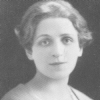Laura Riding

Laura Riding
LauraJacksonwas an American poet, critic, novelist, essayist and short story writer...
NationalityAmerican
ProfessionPoet
Date of Birth16 January 1901
CountryUnited States of America
disappointment self victory
Every woman must live by some sense of victory over disappointments, and Olympias was not the sort of woman to find compensation in her own powers of self-control and endurance.
names ideas two
Politics have always covered two distinct kinds of problems: problems of administrative routine, and those that may be called 'questions of the moment.'... A question of the moment is, indeed, a substitute for some notion, such as the idea of God, or hereditary monarchy, or national glory, that has hitherto acted as a symbol of human co-ordination. It provides no new positive certainty to replace the discredited certainty, but is what the name implies: the raising of a question which the old certainty no longer answers.
religious reality perfection
Euripides seems to have felt that the dignified perfection of Sophocles could be challenged only by novelty and irresponsibility. The religious conditions of the Dionysian festival kept him within certain bounds... But within the imposed limits Euripides was as profane as he dared to be, making melodrama of the divine realities which his predecessors accepted religiously, using the stage merely as a convenience for popularizing his own eccentric values.
character men names
God' is the name given to the most 'important' human idea. In English, as in other languages, the original sense of the word is obscure. But the character of the name is the same in all languages: it is a question. 'God' is the question 'Is there something more important than, something besides, man?
two feelings understanding
I would then say that there are two kinds of feeling. The first is to feel in the sense of concentrating your emotions on something immediately available for your understanding: you make your understanding out of the emotions you have about it. The second is to feel in the sense of being affected without trying to understand: something is felt, you do not know what, and it is more important to feel it than to try to understand it, since once you try to understand it you no longer feel it.
rejection mind body
Anger is precious because it is an immediate, undeniable clue to what our minds (so much more cautious in rejection and resistance than our bodies) will not tolerate.
circles criticism spiders
We live on the circumference of a hollow circle. We draw the circumference, like spiders, out of ourselves: it is all criticism of criticism.
appearance deceiving enough
Appearances do not deceive if there are enough of them.
believe magic doe
I believe that misconceptions about oneself that one does not correct where possible act as a bad magic.
thinking long-ago pieces
When modernist poetry, or what not so long ago passed for modernist poetry, can reach the stage where the following piece by Mr. Ezra Pound is seriously offered as a poem, there is some justification for the plain reader and orthodox critic who shrinks from anything that may be labelled 'modernist' either in terms of condemnation or approbation.... Better he thinks, that ten authentic poets should be left for posterity to discover than one charlatan should be allowed to steal into the Temple of Fame.
musical poetic fit
Shakespeare alternated between musical surrenders to social prestige and magnificent fits of poetic remorse.
writing literature may
All literature is written by the old to teach the young how to express themselves so that they in turn may write literature to teach the old how to express themselves. All literature is written by mentally precocious adolescents and by mentally precocious senescents.
men romance noble
Woman is the symbol to man of the uncleanness of bodily existence, of which he purifies himself by putting her to noble uses. She thus has for him a double, contradictory significance; she is the subject of his bawdry and the subject of his romance.
military writing son
The anthology meets with two different kinds of reactions in living poets. They will either write toward the anthology or away from it. Anti-anthology poets often overreach themselves, inflicting protective distortions on their work - as parents in old Central Europe often deliberately maimed their sons to save them from compulsory military service.